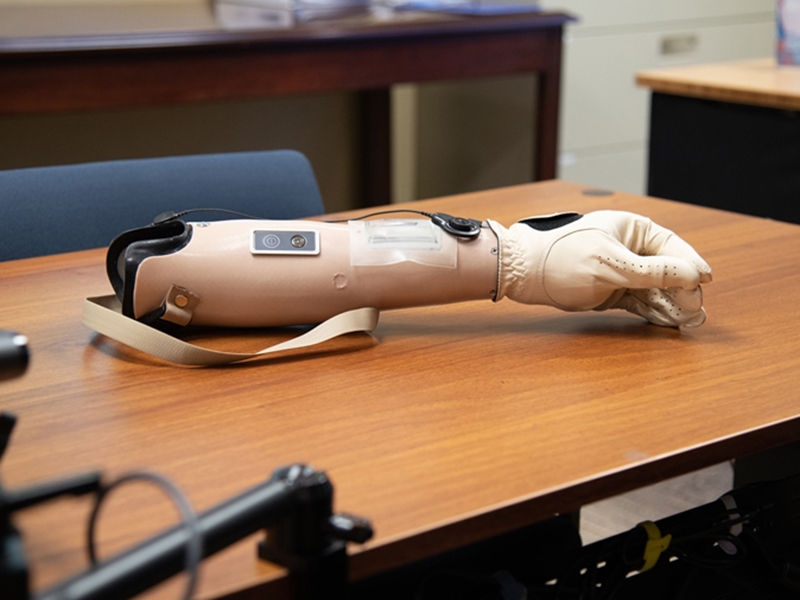The U of A Institute for Integrative & Innovative Research (I³R) has been awarded a $4.9 million grant from the U.S. Department of Defense to expand a clinical trial for an innovative neural-enabled prosthesis currently occurring at the university campus and including Walter Reed National Military Medical Center as an additional clinical trial site.
The addition of Walter Reed Medical Center as a second site is a significant milestone in the institute’s existing clinical trial as it grows from a simple single-site clinical trial to a more complex multi-site clinical trial. Moreover, the collaboration marks a significant advancement in the institute’s work as Walter Reed houses one of the United States’ premier clinics for patients with amputations and is one of just three military hospitals that treat traumatic upper extremity amputations. It is also the first time the university has collaborated with Walter Reed.
“We’re thrilled to receive such a significant grant award under the Joint Warfighter Medical Research Program for continued development and evaluation of an advanced prosthetic device as a potential medical solution that restores meaningful sense of touch to individuals with upper limb amputations,” said Ranu Jung, Ph.D., associate vice chancellor and I³R executive director. “We’re honored to collaborate with Walter Reed National Military Medical Center to extend this life-changing innovation to our service men and women who have sustained traumatic upper limb injuries in service to our country.”
The ongoing clinical trial, titled Neural Enabled Prosthesis for Upper Limb Amputees, seeks to test an innovative prosthetic hand system approved by the Food and Drug Administration for investigation. The system has the potential to deliver meaningful sensations of touch, grip force and hand opening to the user.
To date, two clinical trial participants have received the groundbreaking device. The first study participant received his device in 2018, when the project was based at Florida International University. The second occurred in Arkansas in 2023 through an I³R-led collaboration with University of Arkansas for Medical Sciences and Snell Prosthetics and Orthotics.
“The University of Arkansas, as a land grant institution, is at the forefront of research that changes lives,” said Chancellor Charles Robinson. “Our researchers at the Institute for Integrative and Innovative Research are pioneering solutions to complex problems that affect people in communities across Arkansas and beyond. Collaborating with Walter Reed National Military Medical Center brings Arkansas innovation to a national stage in service of those who have served and sacrificed for our country.”
According to the National Institutes of Health, multi-site clinical trials involve the implementation of the same clinical protocol at two or more independent investigational sites where participants are seen for an intervention and/or outcomes assessment. The current trial is under the US Army Office of Human Research Oversight.
In fall 2022, a research team from Walter Reed visited the U of A to observe I³R laboratory operations and clinical trial protocols for the purpose of duplicating these at the Walter Reed National Military Medical Center in Bethesda, Maryland. While the Walter Reed lab will operate independently, it will work closely with I³R, and the institute will retain leadership and oversight of the overall research study.
“We’ve seen the groundbreaking research that is being performed by I³R and are very excited to offer this potential life-changing intervention to our U.S. service members with limb loss,” said Paul Pasquina, M.D., principal investigator at the Uniformed Services University and Walter Reed National Medical Center.
Dr. Pasquina’s enthusiasm was shared by U.S. Army Col. Kyle Potter, M.D., who will serve as lead surgeon for the military enrollees. “We envision that this project will not only enhance the quality of life of those participating in the study, but lead to advances that uplift individuals across the globe who are living with limb loss,” Potter said.
As of 2017, of the 1,648 U.S. service members who sustained limb loss during the Operation Iraqi Freedom and Operation Enduring Freedom conflicts, 1,224 (about 75%) have received treatment at Walter Reed. From 2003-2012, a total of 255 service members were treated at Walter Reed for traumatic upper limb amputation. The Walter Reed research team will consist of rehabilitative care providers and researchers with strong connections within the Departments of Surgery, Orthotics & Prosthetics, Physical Medicine & Rehabilitation, Physical Therapy, Occupational Therapy and Neurology.
About the Institute for Integrative and Innovative Research (I³R): Established through a $194.7 million gift from the Walton Family Charitable Support Foundation, the University of Arkansas Institute for Integrative and Innovative Research pioneers solutions to wicked problems through convergence research across academic, industry, government, and non-profit sectors to make a positive societal impact by creating and deploying innovations to scale. Learn more at i3r.uark.edu.
About Walter Reed National Military Medical Center: Walter Reed, the world’s premier integrated military medical center and where the nation heals our heroes, strives to provide extraordinary experiences for patients, families and staff while driving tomorrow’s healthcare advances through education, innovation and research. For additional information about Walter Reed, please visit us at walterreed.tricare.mil.
Topics
Contacts
Delia Garcia, director of strategic communications and engagement
Institute for Integrative and Innovative Research
479-718-3328, deliag@uark.edu
